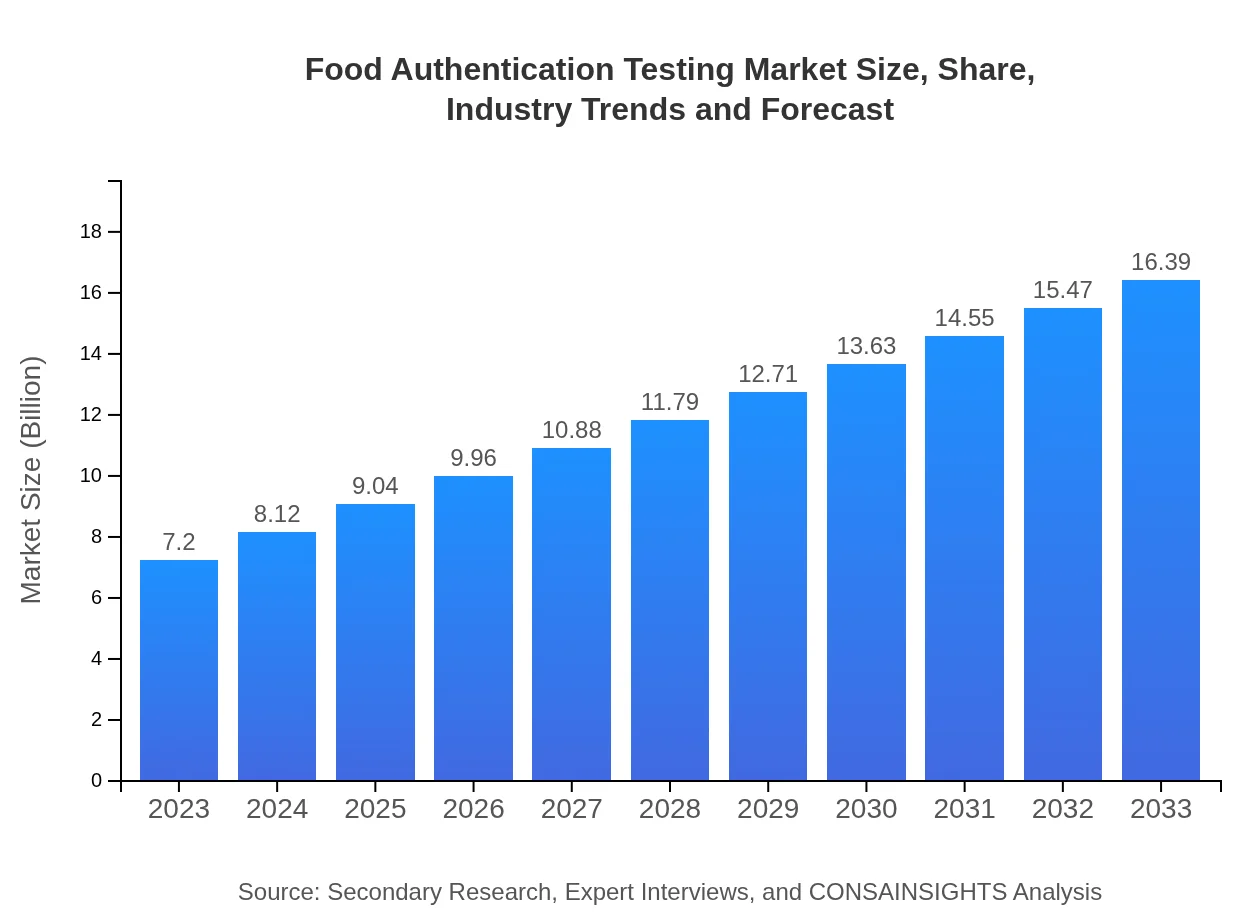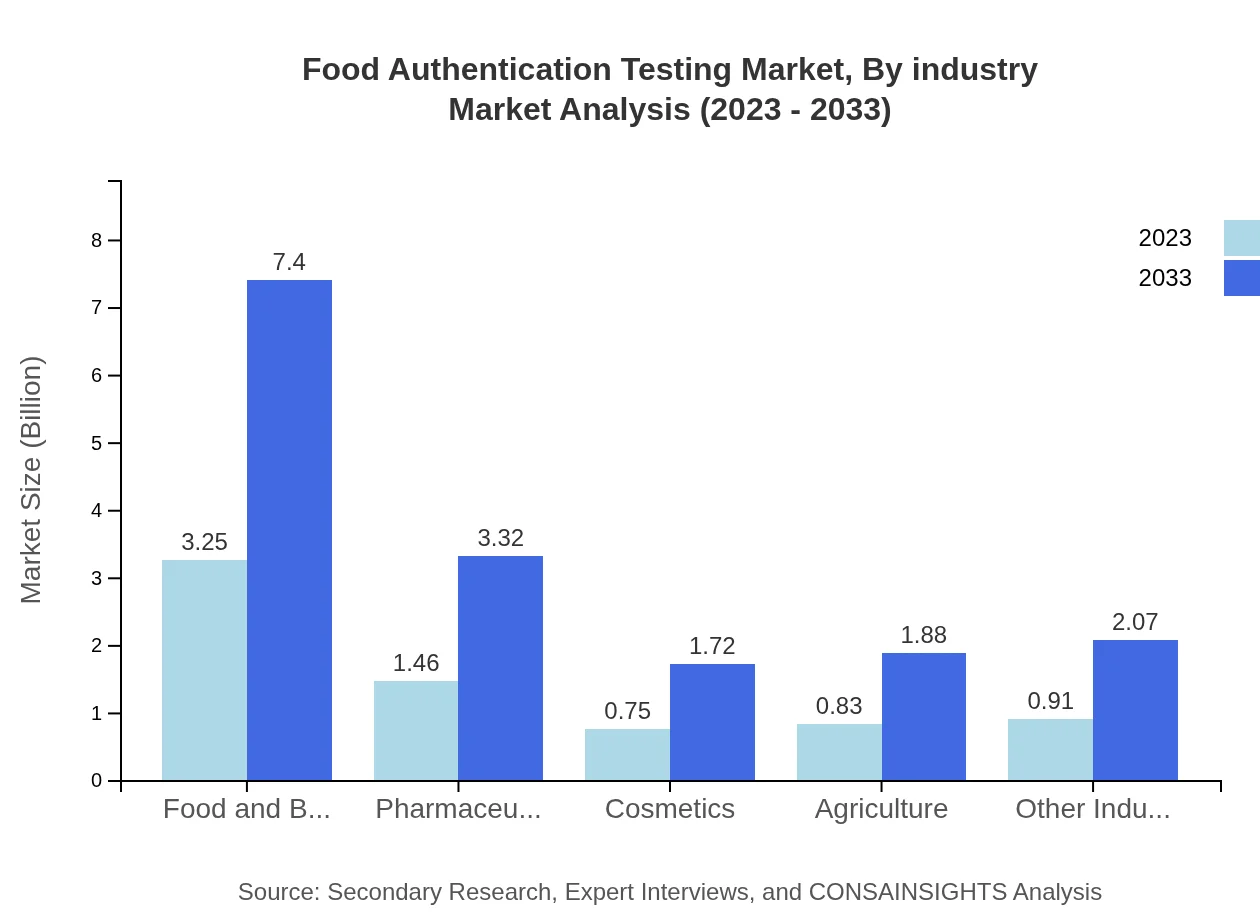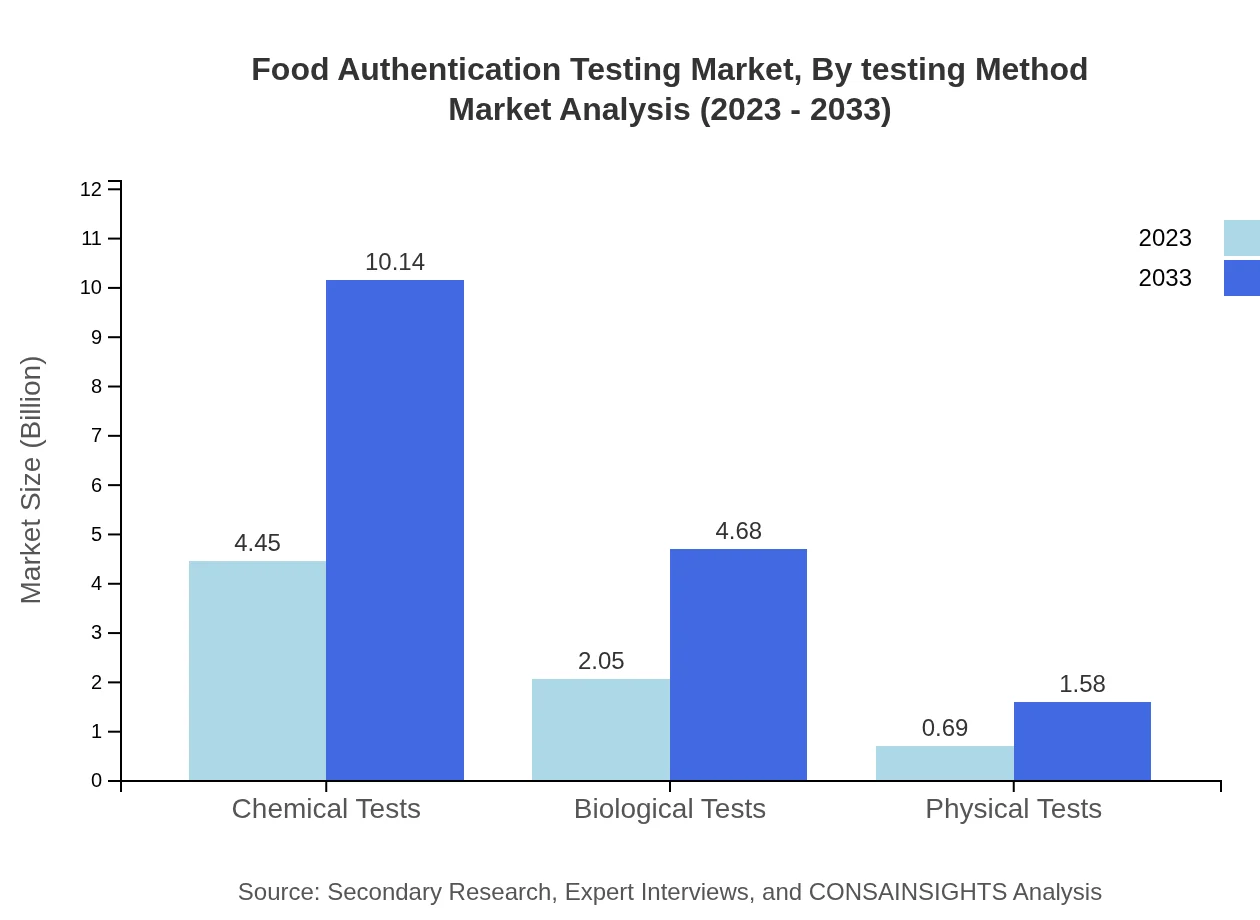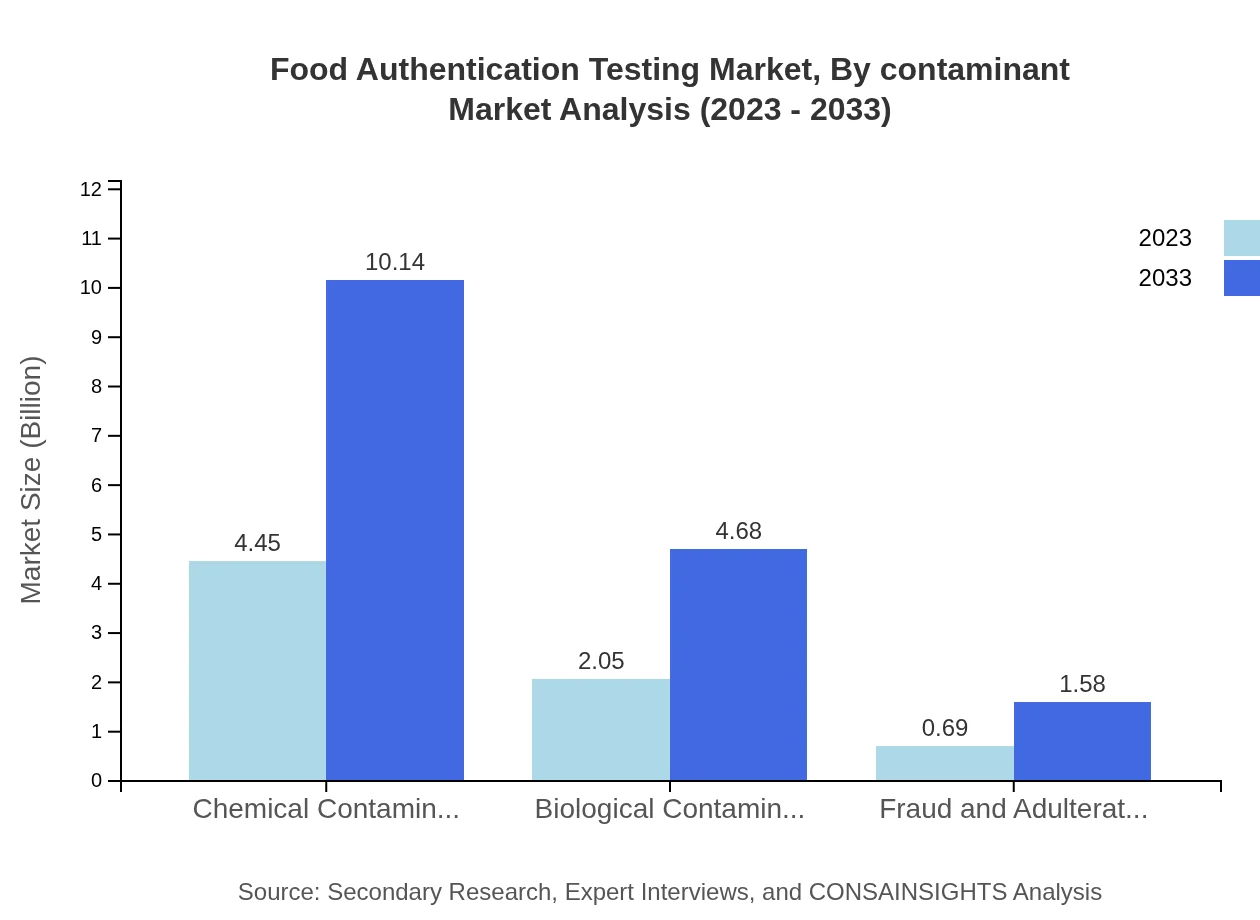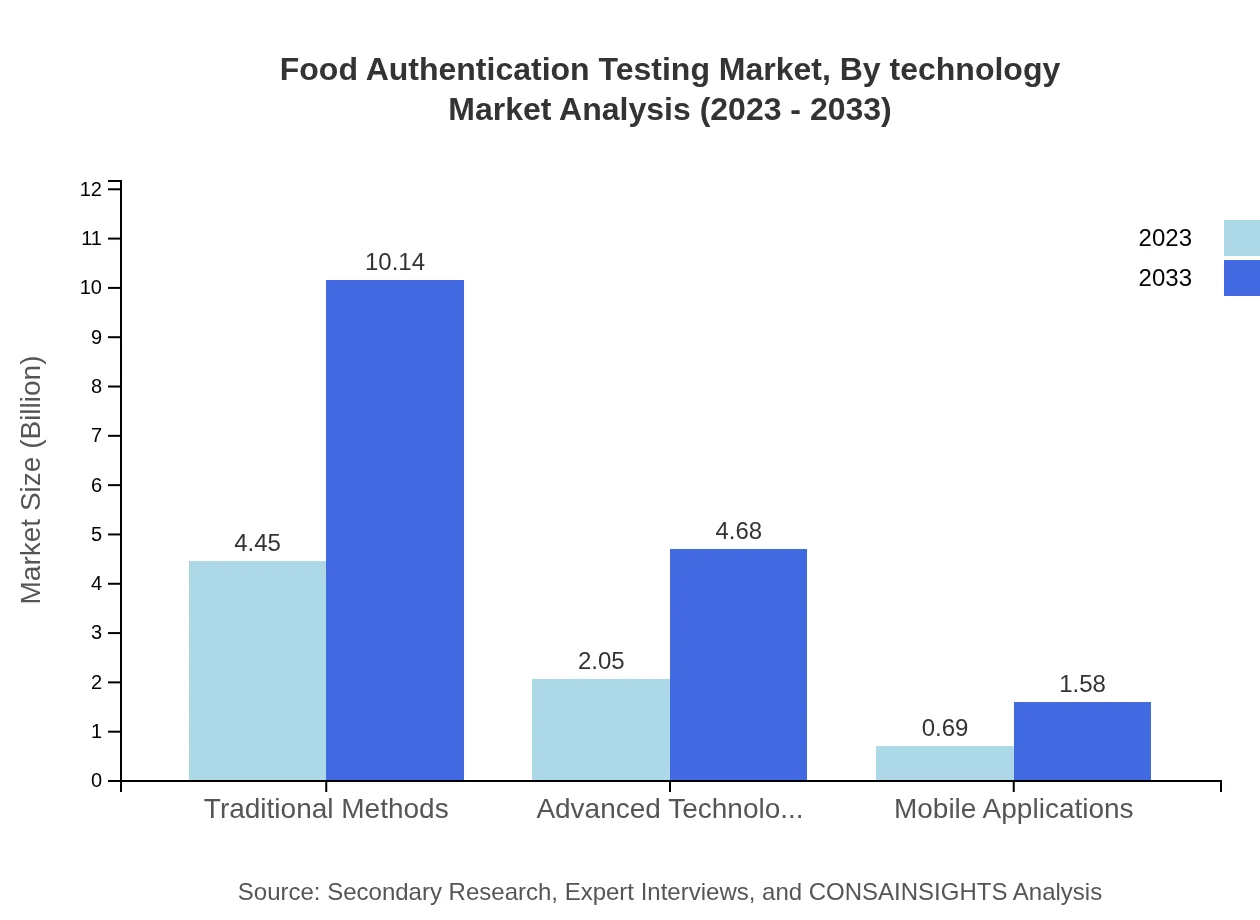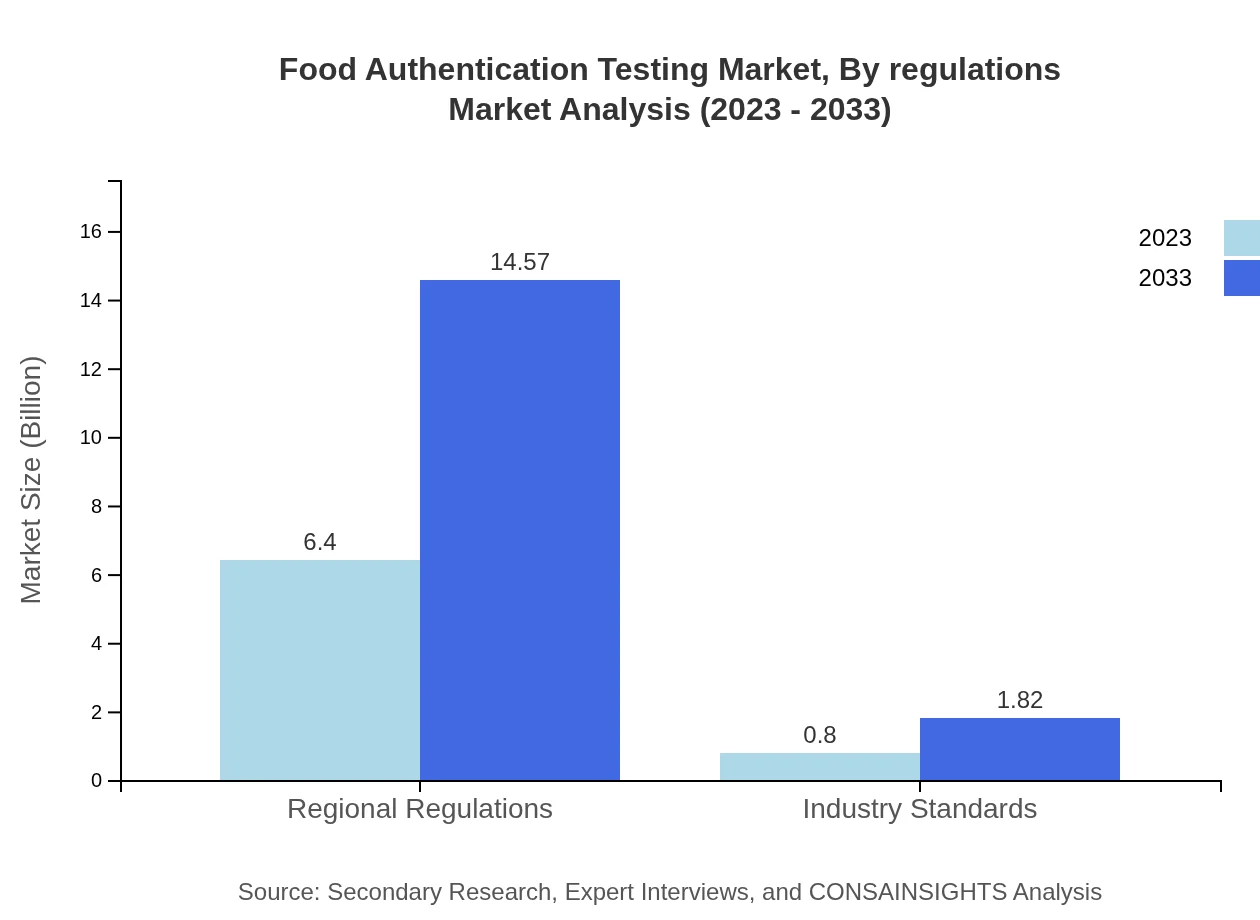Food Authentication Testing Market Report
Published Date: 31 January 2026 | Report Code: food-authentication-testing
Food Authentication Testing Market Size, Share, Industry Trends and Forecast to 2033
This report provides a comprehensive overview of the Food Authentication Testing market through 2023-2033, detailing market size, trends, and key regional insights. It aims to equip stakeholders with actionable intelligence to navigate the evolving landscape of food authenticity.
| Metric | Value |
|---|---|
| Study Period | 2023 - 2033 |
| 2023 Market Size | $7.20 Billion |
| CAGR (2023-2033) | 8.3% |
| 2033 Market Size | $16.39 Billion |
| Top Companies | Neogen Corporation, SGS SA, Eurofins Scientific, Intertek Group plc, TÜV SÜD |
| Last Modified Date | 31 January 2026 |
Food Authentication Testing Market Overview
Customize Food Authentication Testing Market Report market research report
- ✔ Get in-depth analysis of Food Authentication Testing market size, growth, and forecasts.
- ✔ Understand Food Authentication Testing's regional dynamics and industry-specific trends.
- ✔ Identify potential applications, end-user demand, and growth segments in Food Authentication Testing
What is the Market Size & CAGR of Food Authentication Testing market in 2023 and 2033?
Food Authentication Testing Industry Analysis
Food Authentication Testing Market Segmentation and Scope
Tell us your focus area and get a customized research report.
Food Authentication Testing Market Analysis Report by Region
Europe Food Authentication Testing Market Report:
Europe holds a significant market share, starting at USD 1.91 billion in 2023 and anticipated to increase to USD 4.34 billion by 2033. Growing public health concerns and compliance with strict EU food regulations contribute to this growth.Asia Pacific Food Authentication Testing Market Report:
As of 2023, the Asia Pacific Food Authentication Testing market is valued at approximately USD 1.45 billion, expected to reach USD 3.29 billion by 2033. The region is characterized by increasing adoption of advanced testing technologies, enhanced regulatory frameworks, and growing consumer demand for food safety.North America Food Authentication Testing Market Report:
The North American region boasts a Food Authentication Testing market of estimated USD 2.52 billion in 2023, likely to escalate to USD 5.75 billion by 2033. The market here is buoyed by stringent government regulations and high consumer awareness regarding food integrity.South America Food Authentication Testing Market Report:
In South America, the Food Authentication Testing market was valued at USD 0.36 billion in 2023, with expectations to grow to USD 0.82 billion by 2033. This growth is driven by rising incidences of food fraud and the introduction of stricter regulations on food safety.Middle East & Africa Food Authentication Testing Market Report:
The Middle East and Africa Food Authentication Testing market was valued at USD 0.96 billion in 2023 and is projected to reach USD 2.19 billion by 2033. The region's emerging economies are increasingly focusing on food safety standards to meet international compatibility.Tell us your focus area and get a customized research report.
Food Authentication Testing Market Analysis By Industry
The Food Authentication Testing market demonstrates high significance within the food and beverage sector, valued at USD 3.25 billion in 2023 and projected to reach USD 7.40 billion by 2033. Pharmaceuticals represent another vital segment, anticipated to grow from USD 1.46 billion to USD 3.32 billion during the same period. The Cosmetics sector is expected to rise from USD 0.75 billion to USD 1.72 billion, indicating increasing consumer concerns about the authenticity of cosmetic products. Agriculture and Other Industries also play significant roles in market growth, further diversifying the landscape.
Food Authentication Testing Market Analysis By Testing Method
The market is bifurcated into Traditional Methods, representing a sizable share with USD 4.45 billion in 2023, expected to grow to USD 10.14 billion by 2033, while Advanced Technologies (USD 2.05 billion to USD 4.68 billion) showcase a growing trend towards innovation. Mobile Applications will grow from USD 0.69 billion to USD 1.58 billion, indicating a shift towards more accessible testing technologies.
Food Authentication Testing Market Analysis By Contaminant
The Food Authentication Testing market is significantly impacted by contaminant types. The Chemical Contaminants segment leads at USD 4.45 billion in 2023, forecasted to rise to USD 10.14 billion. Biological Contaminants will grow from USD 2.05 billion to USD 4.68 billion, while Fraud and Adulteration are forecasted to advance from USD 0.69 billion to USD 1.58 billion. The variation in significance among these segments highlights the multi-faceted challenges the industry faces regarding food authenticity.
Food Authentication Testing Market Analysis By Technology
The Food Authentication Testing market reflects diversified applications of testing technologies where chemical tests dominate at USD 4.45 billion in 2023, aiming for USD 10.14 billion by 2033. Biological tests and physical tests represent emerging segments projected to grow modestly, thus indicating a shift towards diverse methodologies for food authentication.
Food Authentication Testing Market Analysis By Regulations
Regional Regulations constitute a crucial segment of the market, showing growth from USD 6.40 billion in 2023 to USD 14.57 billion in 2033, reflecting the enforcement of stricter regulations leading to heightened testing requirements. Industry Standards remain significant, albeit at a lower market size, indicating the collaborative efforts needed between regulatory bodies and industry players.
Food Authentication Testing Market Trends and Future Forecast
Tell us your focus area and get a customized research report.
Global Market Leaders and Top Companies in Food Authentication Testing Industry
Neogen Corporation:
A leader in food safety and quality initiatives, providing innovative testing solutions to ensure food authenticity.SGS SA:
A global leader in inspection, verification, testing and certification, SGS offers exceptional services in food authentication.Eurofins Scientific:
Specializes in bioanalytical testing services, Eurofins is at the forefront of providing leading solutions in food authenticity testing.Intertek Group plc:
With a wide variety of food testing services, Intertek ensures integrity and compliance of food products globally.TÜV SÜD:
Known for its stringent testing protocols, TÜV SÜD offers vital assistance in ensuring food authenticity and consumer safety.We're grateful to work with incredible clients.









FAQs
What is the market size of food Authentication Testing?
The food authentication testing market is valued at approximately $7.2 billion in 2023, with a projected CAGR of 8.3% from 2023 to 2033. This growth reflects the increasing demand for food safety and quality assurance globally.
What are the key market players or companies in this food Authentication Testing industry?
Key players in the food authentication testing industry include major companies like Eurofins Scientific, SGS SA, Intertek Group, and AsureQuality. These organizations lead the market with their advanced technologies and comprehensive testing services.
What are the primary factors driving the growth in the food Authentication Testing industry?
Growth in the food authentication testing industry is driven by increasing food safety regulations, rising consumer awareness about food authenticity, and technological advancements in testing methods. Additionally, the need to combat food fraud further propels market demand.
Which region is the fastest Growing in the food Authentication Testing?
The fastest-growing region in the food authentication testing market is projected to be North America, with market growth expanding from $2.52 billion in 2023 to $5.75 billion by 2033. This growth is spurred by stringent regulatory standards and heightened consumer awareness.
Does ConsaInsights provide customized market report data for the food Authentication Testing industry?
Yes, ConsaInsights offers customized market report data tailored to specific needs within the food authentication testing industry. This bespoke approach ensures that clients receive insights relevant to their unique business contexts.
What deliverables can I expect from this food Authentication Testing market research project?
From the food authentication testing market research project, clients can expect detailed market analysis reports, data on market size, growth forecasts, competitive landscape analysis, trend reports, and segment-wise evaluations for informed decision-making.
What are the market trends of food Authentication Testing?
Current trends in the food authentication testing market include the adoption of advanced technologies for testing, the prominence of mobile applications for consumer interaction, and a focus on sustainable practices in food sourcing and testing methods.

